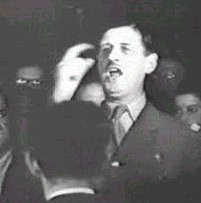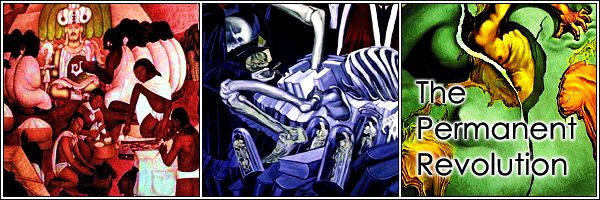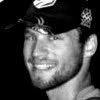CHARACTERS: Frantz Fanon
I came across this good documentary on Frantz Fanon (English-language to boot).
Frantz Fanon was an educated Martinican who fought for France in the Second World War. Facing racism in metropolitan France he used his training as a psychiatrist to understand the subconscious of racism, especially the denial of sexual desire and personhood.

Frantz Fanon
Disenchanted with France and Martinique, he found a new homeland in Algeria, then in the throes of the Algerian War. He fell in love with that revolution, finding an equation between the denial of personhood inherent in racism, and France's denial of the Algerian nation. He became the most eloquent defender of the Algerian Revolution and an advocate of violence as means to liberation. To have one's independence merely "given", "granted" by the colonial overlord could not lead to self-respect. Truly free people were not dependent on others for that freedom, they took it themselves, if necessary through revolutionary violence. He finished his most famous book "The Wretched of the Earth" as he was dying in 1961 which has become the bible of numerous nationa liberation revolutionary and terrorist movements since then.

De Gaulle in liberated Paris 1944: "Paris outraged, Paris broken, Paris martyred, but Paris freed! Freed by herself, freed by her people with the help of the armies of France, with the support and help of all France, of that France which fights, of the sole France, true France, eternal France."
I see some eery parallels with Gaullism. De Gaulle's obsession during and after the Second World War in the idea that France had freed herself from the Nazis, not through English or American help. Later, when he undertook the politics of grandeur in the 1960s, there is the same theme. It didn't matter that America protected France from the Soviet threat. France's self-respect required that France herself defend her independence through the withdrawal from NATO and the French nuclear deterrent. They both seem to share this obsession not with the what of freedom and independence, but the how of self-help as the only means for either to be genuine.

A bus bombed during the Algerian Civil War (1997)
Algeria was not freed as Fanon might have hoped. He thought that to eliminate colonialism might have allowed a "New Man" to be created, surpassing colonized and colonizer. Though the Algerians wrenched their independence from France through violence, they have known only secular left-wing tyranny since. Algeria's economic failure has meant that as that country sought independence from France, thousands of Algerians continue to seek visas for work in France. A conservative Islamic Algeria grew frustrated with the failures of the Marxist revolutionary leadership that Fanon was so enamored with, leading to the disastrous civil war between secular military and Islamic terrorists from 1991 to 2002. Radical revolutions seem to have this irrepressible tendency to disappoint. The man and the society revolutionaries have in mind never seems to match up with what man is actually capable of, and the society they really inhabit.
The doc is well-worth watching despite it having a few cuts and glitches. It has a few bits of the Battle of Algiers woven in and interviews from his family and intellectuals. Stuart Hall especially having some very eloquent and incisive commentary.
Frantz Fanon was an educated Martinican who fought for France in the Second World War. Facing racism in metropolitan France he used his training as a psychiatrist to understand the subconscious of racism, especially the denial of sexual desire and personhood.

Frantz Fanon
Disenchanted with France and Martinique, he found a new homeland in Algeria, then in the throes of the Algerian War. He fell in love with that revolution, finding an equation between the denial of personhood inherent in racism, and France's denial of the Algerian nation. He became the most eloquent defender of the Algerian Revolution and an advocate of violence as means to liberation. To have one's independence merely "given", "granted" by the colonial overlord could not lead to self-respect. Truly free people were not dependent on others for that freedom, they took it themselves, if necessary through revolutionary violence. He finished his most famous book "The Wretched of the Earth" as he was dying in 1961 which has become the bible of numerous nationa liberation revolutionary and terrorist movements since then.

De Gaulle in liberated Paris 1944: "Paris outraged, Paris broken, Paris martyred, but Paris freed! Freed by herself, freed by her people with the help of the armies of France, with the support and help of all France, of that France which fights, of the sole France, true France, eternal France."
I see some eery parallels with Gaullism. De Gaulle's obsession during and after the Second World War in the idea that France had freed herself from the Nazis, not through English or American help. Later, when he undertook the politics of grandeur in the 1960s, there is the same theme. It didn't matter that America protected France from the Soviet threat. France's self-respect required that France herself defend her independence through the withdrawal from NATO and the French nuclear deterrent. They both seem to share this obsession not with the what of freedom and independence, but the how of self-help as the only means for either to be genuine.

A bus bombed during the Algerian Civil War (1997)
Algeria was not freed as Fanon might have hoped. He thought that to eliminate colonialism might have allowed a "New Man" to be created, surpassing colonized and colonizer. Though the Algerians wrenched their independence from France through violence, they have known only secular left-wing tyranny since. Algeria's economic failure has meant that as that country sought independence from France, thousands of Algerians continue to seek visas for work in France. A conservative Islamic Algeria grew frustrated with the failures of the Marxist revolutionary leadership that Fanon was so enamored with, leading to the disastrous civil war between secular military and Islamic terrorists from 1991 to 2002. Radical revolutions seem to have this irrepressible tendency to disappoint. The man and the society revolutionaries have in mind never seems to match up with what man is actually capable of, and the society they really inhabit.
The doc is well-worth watching despite it having a few cuts and glitches. It has a few bits of the Battle of Algiers woven in and interviews from his family and intellectuals. Stuart Hall especially having some very eloquent and incisive commentary.



0 Comments:
Post a Comment
<< Home